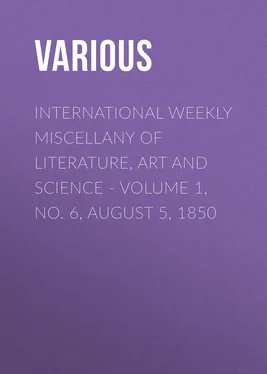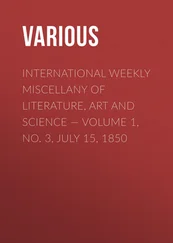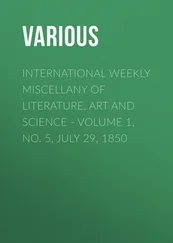Various - International Weekly Miscellany of Literature, Art and Science - Volume 1, No. 6, August 5, 1850
Здесь есть возможность читать онлайн «Various - International Weekly Miscellany of Literature, Art and Science - Volume 1, No. 6, August 5, 1850» — ознакомительный отрывок электронной книги совершенно бесплатно, а после прочтения отрывка купить полную версию. В некоторых случаях можно слушать аудио, скачать через торрент в формате fb2 и присутствует краткое содержание. Жанр: foreign_antique, periodic, foreign_edu, на английском языке. Описание произведения, (предисловие) а так же отзывы посетителей доступны на портале библиотеки ЛибКат.
- Название:International Weekly Miscellany of Literature, Art and Science - Volume 1, No. 6, August 5, 1850
- Автор:
- Жанр:
- Год:неизвестен
- ISBN:нет данных
- Рейтинг книги:3 / 5. Голосов: 1
-
Избранное:Добавить в избранное
- Отзывы:
-
Ваша оценка:
- 60
- 1
- 2
- 3
- 4
- 5
International Weekly Miscellany of Literature, Art and Science - Volume 1, No. 6, August 5, 1850: краткое содержание, описание и аннотация
Предлагаем к чтению аннотацию, описание, краткое содержание или предисловие (зависит от того, что написал сам автор книги «International Weekly Miscellany of Literature, Art and Science - Volume 1, No. 6, August 5, 1850»). Если вы не нашли необходимую информацию о книге — напишите в комментариях, мы постараемся отыскать её.
International Weekly Miscellany of Literature, Art and Science - Volume 1, No. 6, August 5, 1850 — читать онлайн ознакомительный отрывок
Ниже представлен текст книги, разбитый по страницам. Система сохранения места последней прочитанной страницы, позволяет с удобством читать онлайн бесплатно книгу «International Weekly Miscellany of Literature, Art and Science - Volume 1, No. 6, August 5, 1850», без необходимости каждый раз заново искать на чём Вы остановились. Поставьте закладку, и сможете в любой момент перейти на страницу, на которой закончили чтение.
Интервал:
Закладка:
"LONGFELLOW, the pet poet of Boston, is a much younger man than either Bryant or Halleck, and has made his reputation only within the last twelve years, during which time he has been one of the most noted lions of American Athens. The city of Boston, as every one knows who has been there, or who has met with any book or man emanating from it, claims to be the literary metropolis of the United States, and assumes the slightly-pretending soubriquet just quoted. The American Athenians have their thinking and writing done for them by a coterie whose distinctive characteristics are Socinianism in theology, a præter-Puritan prudery in ethics, a German tendency in metaphysics, and throughout all a firm persuasion that Boston is the fountain-head of art, scholarship, and literature for the western world, and particularly that New York is a Nazareth in such things, out of which can come nothing good. For the Bostonians, who certainly cultivate literature with more general devotion, if not always with more individual success than the New Yorkers, can never forgive their commercial neighbors for possessing by birth the two most eminent prose-writers of the country—Irving and Cooper; and by adoption, two of the leading poets—Bryant and Halleck. Nor are the good people of the 'Empire State' slow to resent these exhibitions of small jealousy; but, on the contrary, as the way of the world is, they are apt to retort by greater absurdities. So shy are they of appearing to be guided by the dicta of their eastern friends, that to this day there is scarcely man or woman on Manhattan Island who will confess a liking for Tennyson, Mrs. Barrett Browning, or Robert Browning, simply because these poets were taken up and patronized (metaphorically speaking, of course,) by the 'Mutual Admiration Society' of Boston.
"The immediate influences of this camaraderie are highly flattering and apparently beneficial to the subject of them, but its ultimate effects are most injurious to the proper development of his powers. When the merest trifles that a man throws off are inordinately praised, he soon becomes content with producing the merest trifles. Longfellow has grown unaccustomed to do himself justice. Half his volumes are filled up with translations; graceful and accurate, indeed; but translations, and often from originals of very moderate merit. His last original poem, Evangeline , is a sort of pastoral in hexameters. The resuscitation of this classical metre had a queer effect upon the American quidnuncs. Some of the critics evidently believed it to be a bran-new metre invented for the nonce by the author, a delusion which they of the 'Mutual Admiration' rather winked at; and the parodists who endeavored to ridicule the new measure were evidently not quite sure whether seven feet or nine made a hexameter. It is really to be regretted that Longfellow has been cajoled into playing these tricks with himself, for his earlier pieces were works of much promise, and, had they been worthily followed out, might have entitled him to a high place among the poets of the language.... Longfellow's poetry, whenever he really lays himself out to write poetry, has a definite idea and purpose in it—no small merit now-a-days. His versification is generally harmonious, and he displays a fair command of metre. Sometimes he takes a fancy to an obsolete or out-of-the-way stanza; one of his longest and best poems, The Skeleton in Armor , is exactly in the measure of Drayton's fine ballad on Agincourt. His chief fault is an over-fondness for simile and metaphor. He seems to think indispensable the introduction into everything he writes of a certain (or sometimes a very uncertain) number of these figures. Accordingly his poems are crowded with comparisons, sometimes very pretty and pleasing, at others so far-fetched that the string of tortured images which lead off Alfred de Musset's bizarre Ode to the Moon can hardly equal them. This making figures (whether from any connection with the calculating habits of the people or not) is a terrible propensity of American writers, whether of prose or verse. Their orators are especial sinners in this respect. We have seen speeches stuck as full of metaphors (more or less mixed) as Burton's Anatomy is of quotations.
"Such persons as know from experience that literary people are not always in private life what their writings would betoken, that Miss Bunions do not precisely resemble March violets, and mourners upon paper may be laughers over mahogany—such persons will not be surprised to hear that the Longfellow is a very jolly fellow, a lover of fun and good dinners, and of an amiability and personal popularity that have aided not a little the popularity of his writings in verse and prose—for he writes prose too, prettier, quainter, more figurative, and more poetic if anything, than his poetry. He is also a professor at Harvard College, near Boston.
"EDGAR A. POE, like Longfellow and most of the other American poets, wrote prose as well as poetry, having produced a number of wild, grotesque, and powerfully-imagined tales; unlike most of them he was a literary man pur sang . He depended for support entirely on his writings, and his career was more like the precarious existence of an author in the time of Johnson and Savage than the decent life of an author in our own day. He was a Southerner by birth, acquired a liberal education, and what the French call 'expansive' tastes, was adopted by a rich relative, quarreled with him, married 'for love,' and lived by editing magazines in Richmond, Philadelphia, and New York; by delivering lectures (the never-failing last resort of the American literary adventurer); by the occasional subscriptions of compassionate acquaintances or admiring friends—any way he could—for eighteen or nineteen years: lost his wife, involved himself in endless difficulties, and finally died in what should have been the prime of his life, about six months ago. His enemies attributed his untimely death to intemperance; his writings would rather lead to the belief that he was an habitual taker of opium. If it make a man a poet to be
Конец ознакомительного фрагмента.
Текст предоставлен ООО «ЛитРес».
Прочитайте эту книгу целиком, купив полную легальную версию на ЛитРес.
Безопасно оплатить книгу можно банковской картой Visa, MasterCard, Maestro, со счета мобильного телефона, с платежного терминала, в салоне МТС или Связной, через PayPal, WebMoney, Яндекс.Деньги, QIWI Кошелек, бонусными картами или другим удобным Вам способом.
Интервал:
Закладка:
Похожие книги на «International Weekly Miscellany of Literature, Art and Science - Volume 1, No. 6, August 5, 1850»
Представляем Вашему вниманию похожие книги на «International Weekly Miscellany of Literature, Art and Science - Volume 1, No. 6, August 5, 1850» списком для выбора. Мы отобрали схожую по названию и смыслу литературу в надежде предоставить читателям больше вариантов отыскать новые, интересные, ещё непрочитанные произведения.
Обсуждение, отзывы о книге «International Weekly Miscellany of Literature, Art and Science - Volume 1, No. 6, August 5, 1850» и просто собственные мнения читателей. Оставьте ваши комментарии, напишите, что Вы думаете о произведении, его смысле или главных героях. Укажите что конкретно понравилось, а что нет, и почему Вы так считаете.












